MGMT9 Business Communication: Facebook and GDPR Annotated Bibliography
VerifiedAdded on 2022/08/01
|10
|2351
|31
Annotated Bibliography
AI Summary
This annotated bibliography examines the contemporary issue of Facebook and its potential regulations, particularly concerning the General Data Protection Regulation (GDPR) in the European Union. The assignment provides an in-depth analysis of ten different sources, each with an annotation summarizing the central theme and scope of the work. The sources include journal articles and research papers that explore various facets of the issue, such as data protection laws, the impact of GDPR on business models, Facebook user data security, and the right to be forgotten. The annotations also evaluate the perspectives of different authors and their contributions to understanding the complexities of online privacy, data governance, and the implications for businesses and users alike. The bibliography covers a range of viewpoints, from legal and regulatory frameworks to user awareness and the impact on digital marketing strategies, providing a comprehensive overview of the current challenges and opportunities related to Facebook and data privacy regulations.
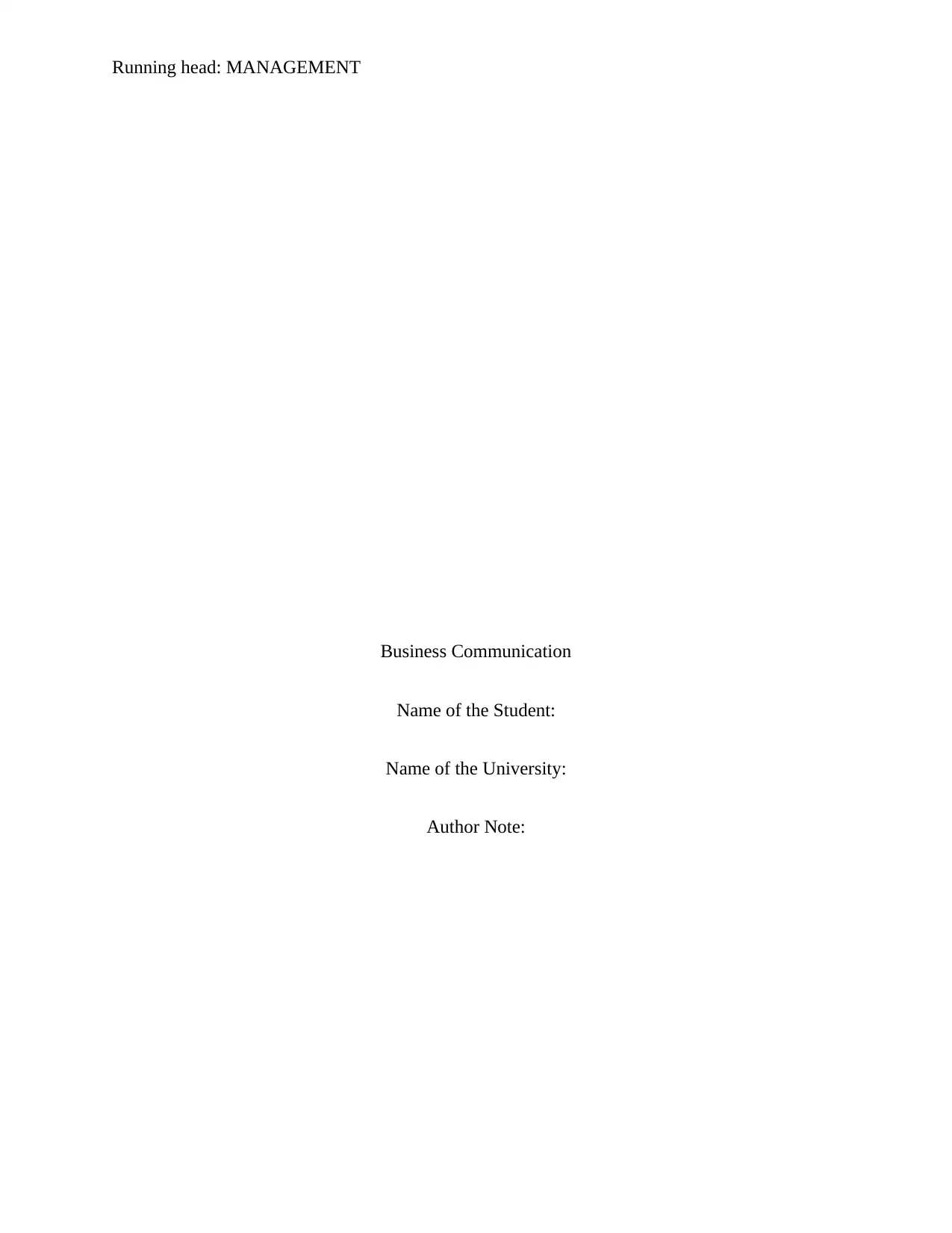
Running head: MANAGEMENT
Business Communication
Name of the Student:
Name of the University:
Author Note:
Business Communication
Name of the Student:
Name of the University:
Author Note:
Paraphrase This Document
Need a fresh take? Get an instant paraphrase of this document with our AI Paraphraser
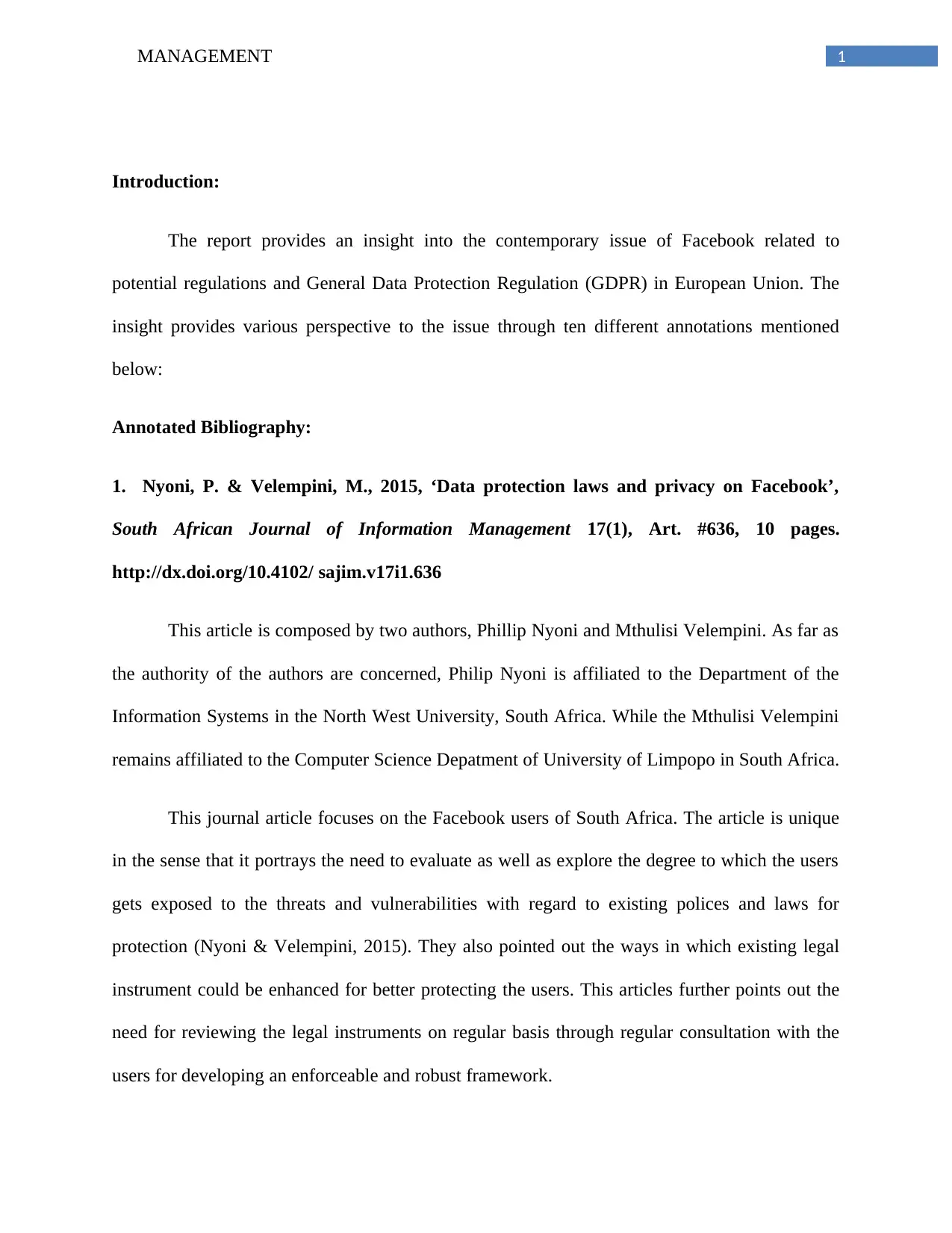
1MANAGEMENT
Introduction:
The report provides an insight into the contemporary issue of Facebook related to
potential regulations and General Data Protection Regulation (GDPR) in European Union. The
insight provides various perspective to the issue through ten different annotations mentioned
below:
Annotated Bibliography:
1. Nyoni, P. & Velempini, M., 2015, ‘Data protection laws and privacy on Facebook’,
South African Journal of Information Management 17(1), Art. #636, 10 pages.
http://dx.doi.org/10.4102/ sajim.v17i1.636
This article is composed by two authors, Phillip Nyoni and Mthulisi Velempini. As far as
the authority of the authors are concerned, Philip Nyoni is affiliated to the Department of the
Information Systems in the North West University, South Africa. While the Mthulisi Velempini
remains affiliated to the Computer Science Depatment of University of Limpopo in South Africa.
This journal article focuses on the Facebook users of South Africa. The article is unique
in the sense that it portrays the need to evaluate as well as explore the degree to which the users
gets exposed to the threats and vulnerabilities with regard to existing polices and laws for
protection (Nyoni & Velempini, 2015). They also pointed out the ways in which existing legal
instrument could be enhanced for better protecting the users. This articles further points out the
need for reviewing the legal instruments on regular basis through regular consultation with the
users for developing an enforceable and robust framework.
Introduction:
The report provides an insight into the contemporary issue of Facebook related to
potential regulations and General Data Protection Regulation (GDPR) in European Union. The
insight provides various perspective to the issue through ten different annotations mentioned
below:
Annotated Bibliography:
1. Nyoni, P. & Velempini, M., 2015, ‘Data protection laws and privacy on Facebook’,
South African Journal of Information Management 17(1), Art. #636, 10 pages.
http://dx.doi.org/10.4102/ sajim.v17i1.636
This article is composed by two authors, Phillip Nyoni and Mthulisi Velempini. As far as
the authority of the authors are concerned, Philip Nyoni is affiliated to the Department of the
Information Systems in the North West University, South Africa. While the Mthulisi Velempini
remains affiliated to the Computer Science Depatment of University of Limpopo in South Africa.
This journal article focuses on the Facebook users of South Africa. The article is unique
in the sense that it portrays the need to evaluate as well as explore the degree to which the users
gets exposed to the threats and vulnerabilities with regard to existing polices and laws for
protection (Nyoni & Velempini, 2015). They also pointed out the ways in which existing legal
instrument could be enhanced for better protecting the users. This articles further points out the
need for reviewing the legal instruments on regular basis through regular consultation with the
users for developing an enforceable and robust framework.
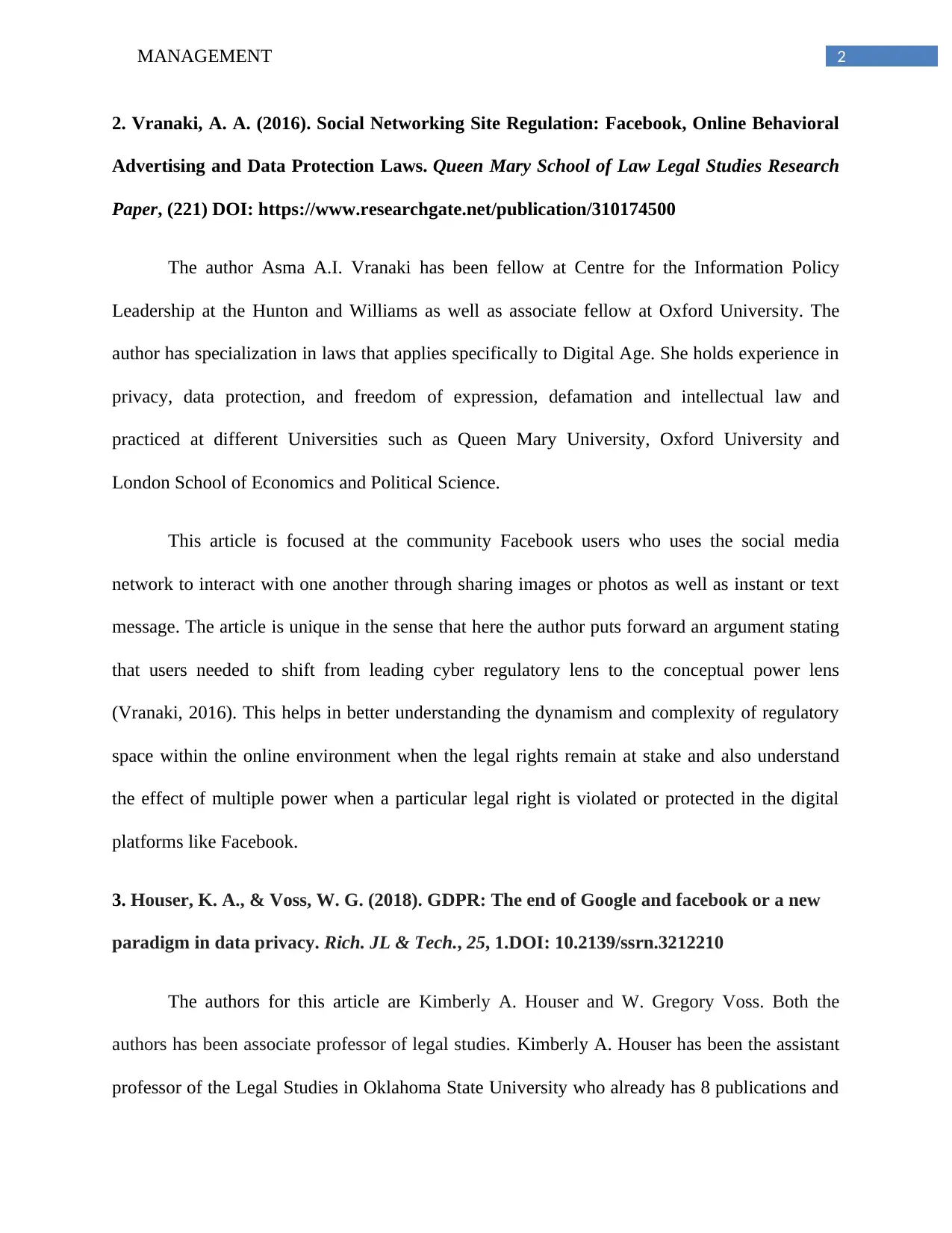
2MANAGEMENT
2. Vranaki, A. A. (2016). Social Networking Site Regulation: Facebook, Online Behavioral
Advertising and Data Protection Laws. Queen Mary School of Law Legal Studies Research
Paper, (221) DOI: https://www.researchgate.net/publication/310174500
The author Asma A.I. Vranaki has been fellow at Centre for the Information Policy
Leadership at the Hunton and Williams as well as associate fellow at Oxford University. The
author has specialization in laws that applies specifically to Digital Age. She holds experience in
privacy, data protection, and freedom of expression, defamation and intellectual law and
practiced at different Universities such as Queen Mary University, Oxford University and
London School of Economics and Political Science.
This article is focused at the community Facebook users who uses the social media
network to interact with one another through sharing images or photos as well as instant or text
message. The article is unique in the sense that here the author puts forward an argument stating
that users needed to shift from leading cyber regulatory lens to the conceptual power lens
(Vranaki, 2016). This helps in better understanding the dynamism and complexity of regulatory
space within the online environment when the legal rights remain at stake and also understand
the effect of multiple power when a particular legal right is violated or protected in the digital
platforms like Facebook.
3. Houser, K. A., & Voss, W. G. (2018). GDPR: The end of Google and facebook or a new
paradigm in data privacy. Rich. JL & Tech., 25, 1.DOI: 10.2139/ssrn.3212210
The authors for this article are Kimberly A. Houser and W. Gregory Voss. Both the
authors has been associate professor of legal studies. Kimberly A. Houser has been the assistant
professor of the Legal Studies in Oklahoma State University who already has 8 publications and
2. Vranaki, A. A. (2016). Social Networking Site Regulation: Facebook, Online Behavioral
Advertising and Data Protection Laws. Queen Mary School of Law Legal Studies Research
Paper, (221) DOI: https://www.researchgate.net/publication/310174500
The author Asma A.I. Vranaki has been fellow at Centre for the Information Policy
Leadership at the Hunton and Williams as well as associate fellow at Oxford University. The
author has specialization in laws that applies specifically to Digital Age. She holds experience in
privacy, data protection, and freedom of expression, defamation and intellectual law and
practiced at different Universities such as Queen Mary University, Oxford University and
London School of Economics and Political Science.
This article is focused at the community Facebook users who uses the social media
network to interact with one another through sharing images or photos as well as instant or text
message. The article is unique in the sense that here the author puts forward an argument stating
that users needed to shift from leading cyber regulatory lens to the conceptual power lens
(Vranaki, 2016). This helps in better understanding the dynamism and complexity of regulatory
space within the online environment when the legal rights remain at stake and also understand
the effect of multiple power when a particular legal right is violated or protected in the digital
platforms like Facebook.
3. Houser, K. A., & Voss, W. G. (2018). GDPR: The end of Google and facebook or a new
paradigm in data privacy. Rich. JL & Tech., 25, 1.DOI: 10.2139/ssrn.3212210
The authors for this article are Kimberly A. Houser and W. Gregory Voss. Both the
authors has been associate professor of legal studies. Kimberly A. Houser has been the assistant
professor of the Legal Studies in Oklahoma State University who already has 8 publications and
⊘ This is a preview!⊘
Do you want full access?
Subscribe today to unlock all pages.

Trusted by 1+ million students worldwide
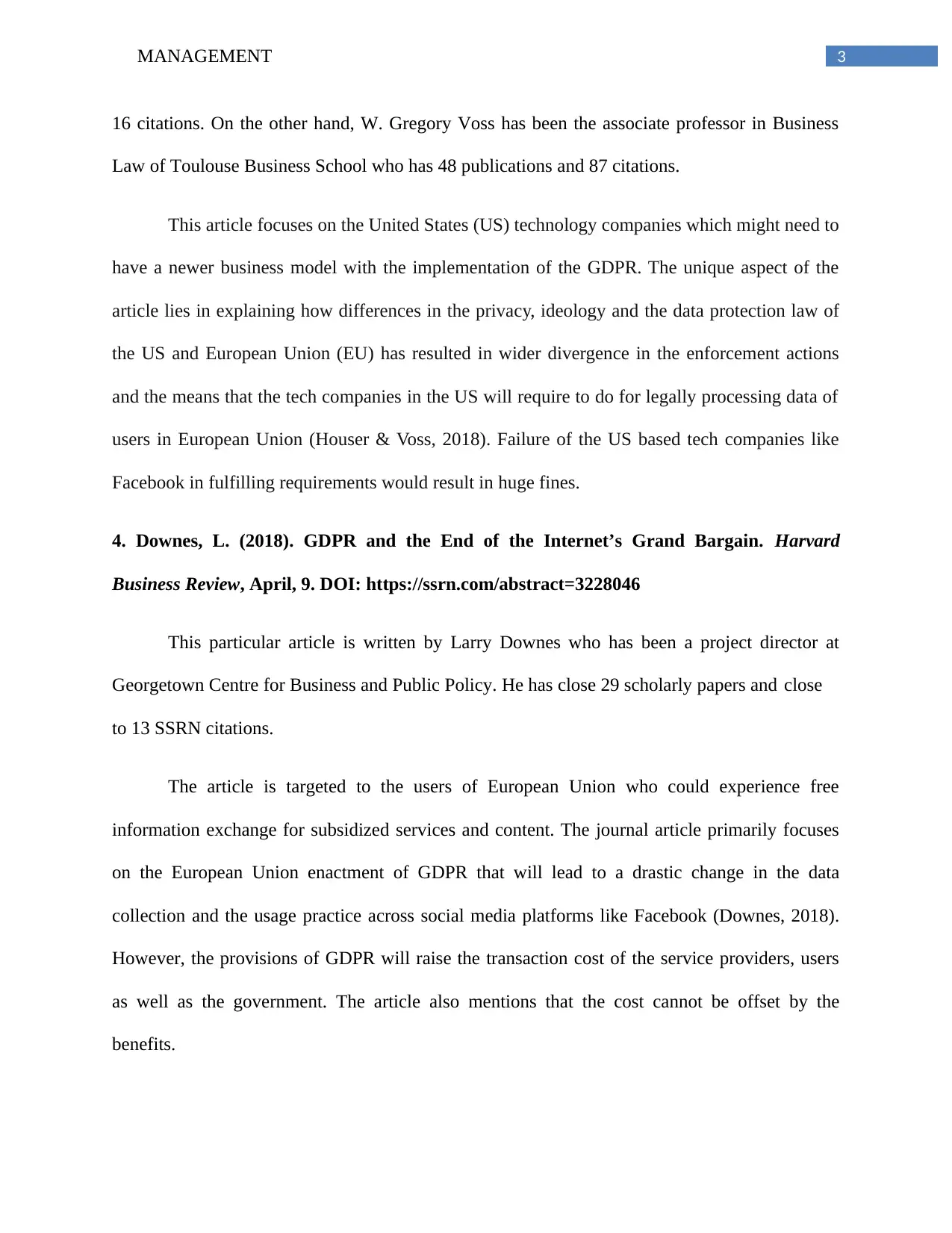
3MANAGEMENT
16 citations. On the other hand, W. Gregory Voss has been the associate professor in Business
Law of Toulouse Business School who has 48 publications and 87 citations.
This article focuses on the United States (US) technology companies which might need to
have a newer business model with the implementation of the GDPR. The unique aspect of the
article lies in explaining how differences in the privacy, ideology and the data protection law of
the US and European Union (EU) has resulted in wider divergence in the enforcement actions
and the means that the tech companies in the US will require to do for legally processing data of
users in European Union (Houser & Voss, 2018). Failure of the US based tech companies like
Facebook in fulfilling requirements would result in huge fines.
4. Downes, L. (2018). GDPR and the End of the Internet’s Grand Bargain. Harvard
Business Review, April, 9. DOI: https://ssrn.com/abstract=3228046
This particular article is written by Larry Downes who has been a project director at
Georgetown Centre for Business and Public Policy. He has close 29 scholarly papers and close
to 13 SSRN citations.
The article is targeted to the users of European Union who could experience free
information exchange for subsidized services and content. The journal article primarily focuses
on the European Union enactment of GDPR that will lead to a drastic change in the data
collection and the usage practice across social media platforms like Facebook (Downes, 2018).
However, the provisions of GDPR will raise the transaction cost of the service providers, users
as well as the government. The article also mentions that the cost cannot be offset by the
benefits.
16 citations. On the other hand, W. Gregory Voss has been the associate professor in Business
Law of Toulouse Business School who has 48 publications and 87 citations.
This article focuses on the United States (US) technology companies which might need to
have a newer business model with the implementation of the GDPR. The unique aspect of the
article lies in explaining how differences in the privacy, ideology and the data protection law of
the US and European Union (EU) has resulted in wider divergence in the enforcement actions
and the means that the tech companies in the US will require to do for legally processing data of
users in European Union (Houser & Voss, 2018). Failure of the US based tech companies like
Facebook in fulfilling requirements would result in huge fines.
4. Downes, L. (2018). GDPR and the End of the Internet’s Grand Bargain. Harvard
Business Review, April, 9. DOI: https://ssrn.com/abstract=3228046
This particular article is written by Larry Downes who has been a project director at
Georgetown Centre for Business and Public Policy. He has close 29 scholarly papers and close
to 13 SSRN citations.
The article is targeted to the users of European Union who could experience free
information exchange for subsidized services and content. The journal article primarily focuses
on the European Union enactment of GDPR that will lead to a drastic change in the data
collection and the usage practice across social media platforms like Facebook (Downes, 2018).
However, the provisions of GDPR will raise the transaction cost of the service providers, users
as well as the government. The article also mentions that the cost cannot be offset by the
benefits.
Paraphrase This Document
Need a fresh take? Get an instant paraphrase of this document with our AI Paraphraser
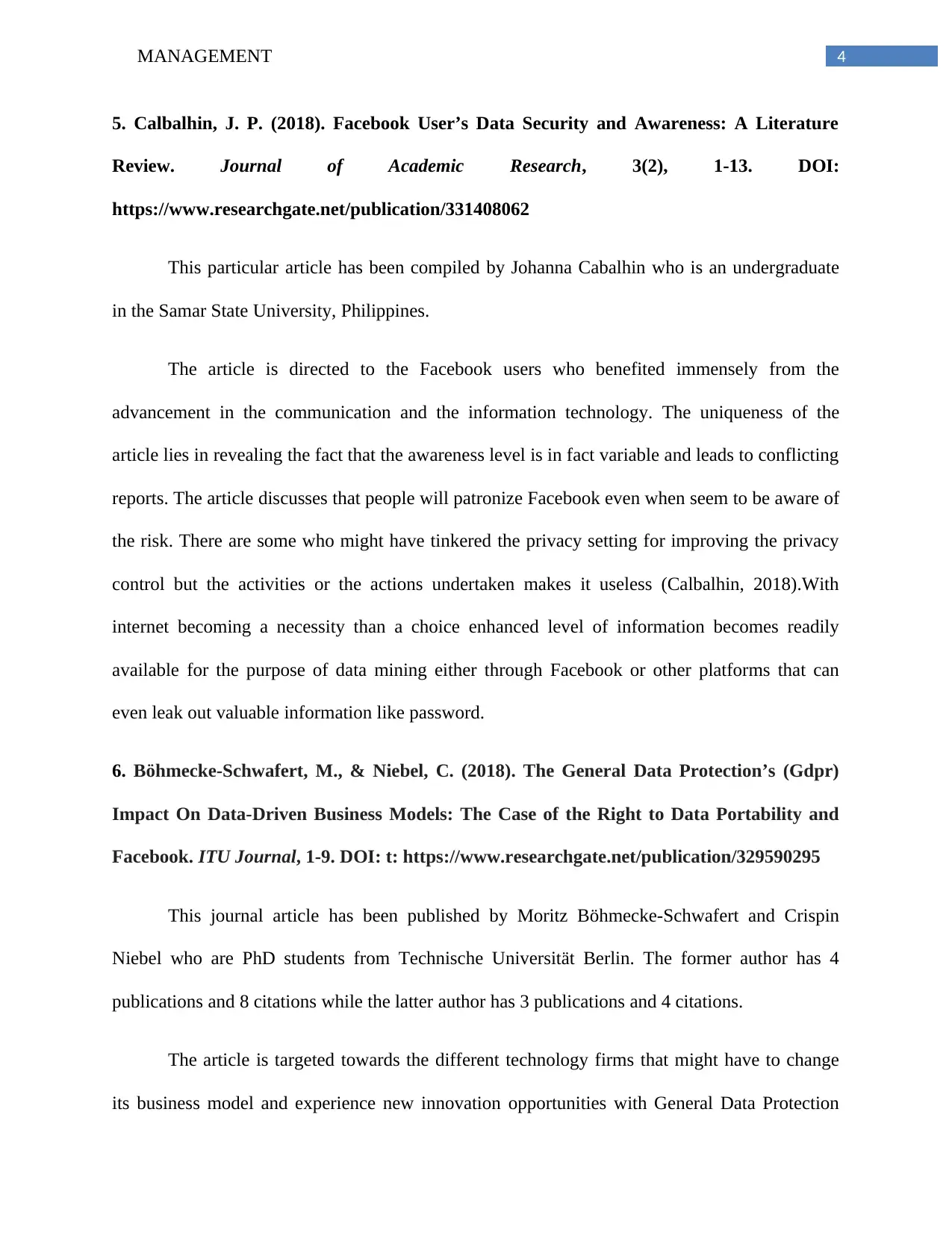
4MANAGEMENT
5. Calbalhin, J. P. (2018). Facebook User’s Data Security and Awareness: A Literature
Review. Journal of Academic Research, 3(2), 1-13. DOI:
https://www.researchgate.net/publication/331408062
This particular article has been compiled by Johanna Cabalhin who is an undergraduate
in the Samar State University, Philippines.
The article is directed to the Facebook users who benefited immensely from the
advancement in the communication and the information technology. The uniqueness of the
article lies in revealing the fact that the awareness level is in fact variable and leads to conflicting
reports. The article discusses that people will patronize Facebook even when seem to be aware of
the risk. There are some who might have tinkered the privacy setting for improving the privacy
control but the activities or the actions undertaken makes it useless (Calbalhin, 2018).With
internet becoming a necessity than a choice enhanced level of information becomes readily
available for the purpose of data mining either through Facebook or other platforms that can
even leak out valuable information like password.
6. Böhmecke-Schwafert, M., & Niebel, C. (2018). The General Data Protection’s (Gdpr)
Impact On Data-Driven Business Models: The Case of the Right to Data Portability and
Facebook. ITU Journal, 1-9. DOI: t: https://www.researchgate.net/publication/329590295
This journal article has been published by Moritz Böhmecke-Schwafert and Crispin
Niebel who are PhD students from Technische Universität Berlin. The former author has 4
publications and 8 citations while the latter author has 3 publications and 4 citations.
The article is targeted towards the different technology firms that might have to change
its business model and experience new innovation opportunities with General Data Protection
5. Calbalhin, J. P. (2018). Facebook User’s Data Security and Awareness: A Literature
Review. Journal of Academic Research, 3(2), 1-13. DOI:
https://www.researchgate.net/publication/331408062
This particular article has been compiled by Johanna Cabalhin who is an undergraduate
in the Samar State University, Philippines.
The article is directed to the Facebook users who benefited immensely from the
advancement in the communication and the information technology. The uniqueness of the
article lies in revealing the fact that the awareness level is in fact variable and leads to conflicting
reports. The article discusses that people will patronize Facebook even when seem to be aware of
the risk. There are some who might have tinkered the privacy setting for improving the privacy
control but the activities or the actions undertaken makes it useless (Calbalhin, 2018).With
internet becoming a necessity than a choice enhanced level of information becomes readily
available for the purpose of data mining either through Facebook or other platforms that can
even leak out valuable information like password.
6. Böhmecke-Schwafert, M., & Niebel, C. (2018). The General Data Protection’s (Gdpr)
Impact On Data-Driven Business Models: The Case of the Right to Data Portability and
Facebook. ITU Journal, 1-9. DOI: t: https://www.researchgate.net/publication/329590295
This journal article has been published by Moritz Böhmecke-Schwafert and Crispin
Niebel who are PhD students from Technische Universität Berlin. The former author has 4
publications and 8 citations while the latter author has 3 publications and 4 citations.
The article is targeted towards the different technology firms that might have to change
its business model and experience new innovation opportunities with General Data Protection
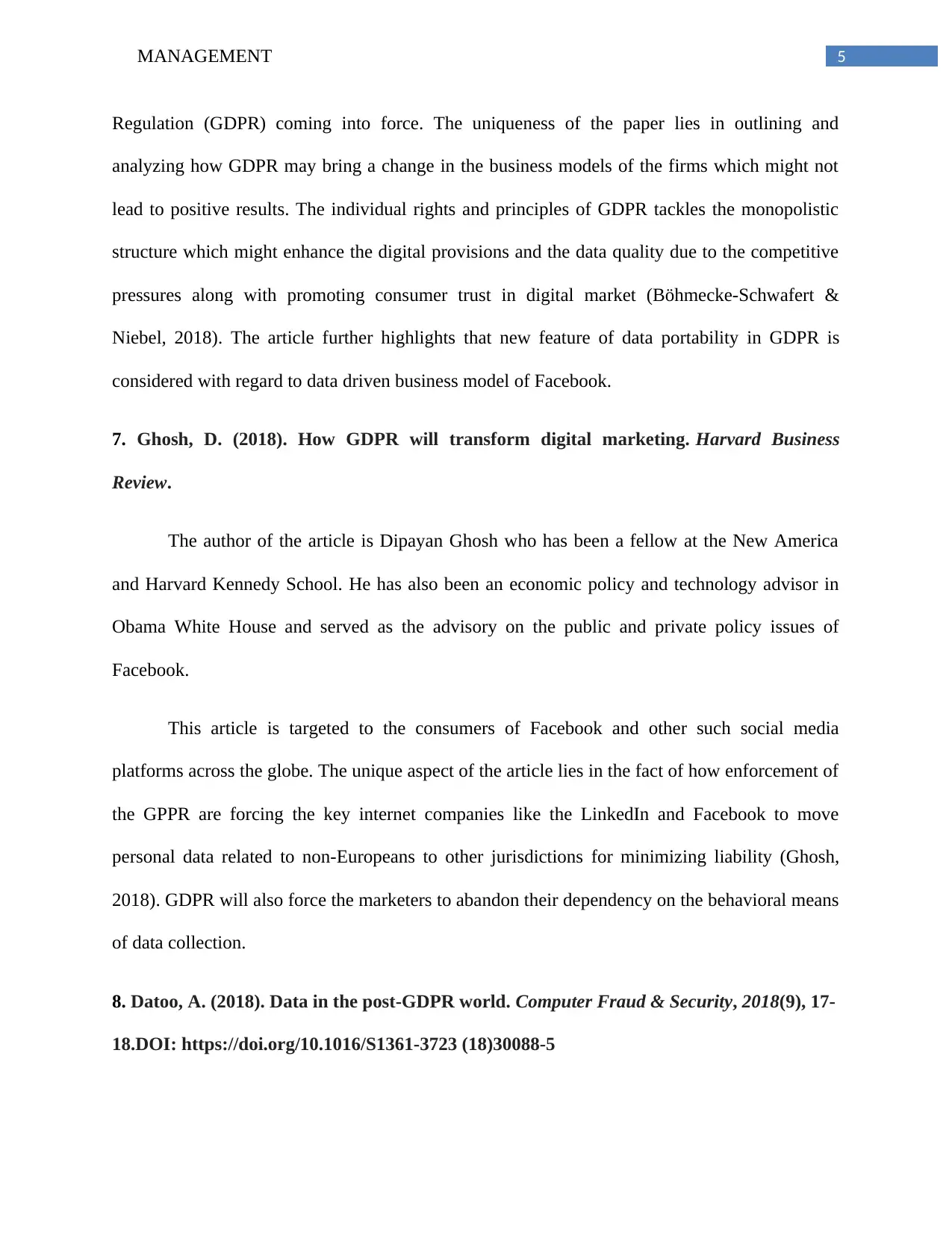
5MANAGEMENT
Regulation (GDPR) coming into force. The uniqueness of the paper lies in outlining and
analyzing how GDPR may bring a change in the business models of the firms which might not
lead to positive results. The individual rights and principles of GDPR tackles the monopolistic
structure which might enhance the digital provisions and the data quality due to the competitive
pressures along with promoting consumer trust in digital market (Böhmecke-Schwafert &
Niebel, 2018). The article further highlights that new feature of data portability in GDPR is
considered with regard to data driven business model of Facebook.
7. Ghosh, D. (2018). How GDPR will transform digital marketing. Harvard Business
Review.
The author of the article is Dipayan Ghosh who has been a fellow at the New America
and Harvard Kennedy School. He has also been an economic policy and technology advisor in
Obama White House and served as the advisory on the public and private policy issues of
Facebook.
This article is targeted to the consumers of Facebook and other such social media
platforms across the globe. The unique aspect of the article lies in the fact of how enforcement of
the GPPR are forcing the key internet companies like the LinkedIn and Facebook to move
personal data related to non-Europeans to other jurisdictions for minimizing liability (Ghosh,
2018). GDPR will also force the marketers to abandon their dependency on the behavioral means
of data collection.
8. Datoo, A. (2018). Data in the post-GDPR world. Computer Fraud & Security, 2018(9), 17-
18.DOI: https://doi.org/10.1016/S1361-3723 (18)30088-5
Regulation (GDPR) coming into force. The uniqueness of the paper lies in outlining and
analyzing how GDPR may bring a change in the business models of the firms which might not
lead to positive results. The individual rights and principles of GDPR tackles the monopolistic
structure which might enhance the digital provisions and the data quality due to the competitive
pressures along with promoting consumer trust in digital market (Böhmecke-Schwafert &
Niebel, 2018). The article further highlights that new feature of data portability in GDPR is
considered with regard to data driven business model of Facebook.
7. Ghosh, D. (2018). How GDPR will transform digital marketing. Harvard Business
Review.
The author of the article is Dipayan Ghosh who has been a fellow at the New America
and Harvard Kennedy School. He has also been an economic policy and technology advisor in
Obama White House and served as the advisory on the public and private policy issues of
Facebook.
This article is targeted to the consumers of Facebook and other such social media
platforms across the globe. The unique aspect of the article lies in the fact of how enforcement of
the GPPR are forcing the key internet companies like the LinkedIn and Facebook to move
personal data related to non-Europeans to other jurisdictions for minimizing liability (Ghosh,
2018). GDPR will also force the marketers to abandon their dependency on the behavioral means
of data collection.
8. Datoo, A. (2018). Data in the post-GDPR world. Computer Fraud & Security, 2018(9), 17-
18.DOI: https://doi.org/10.1016/S1361-3723 (18)30088-5
⊘ This is a preview!⊘
Do you want full access?
Subscribe today to unlock all pages.

Trusted by 1+ million students worldwide
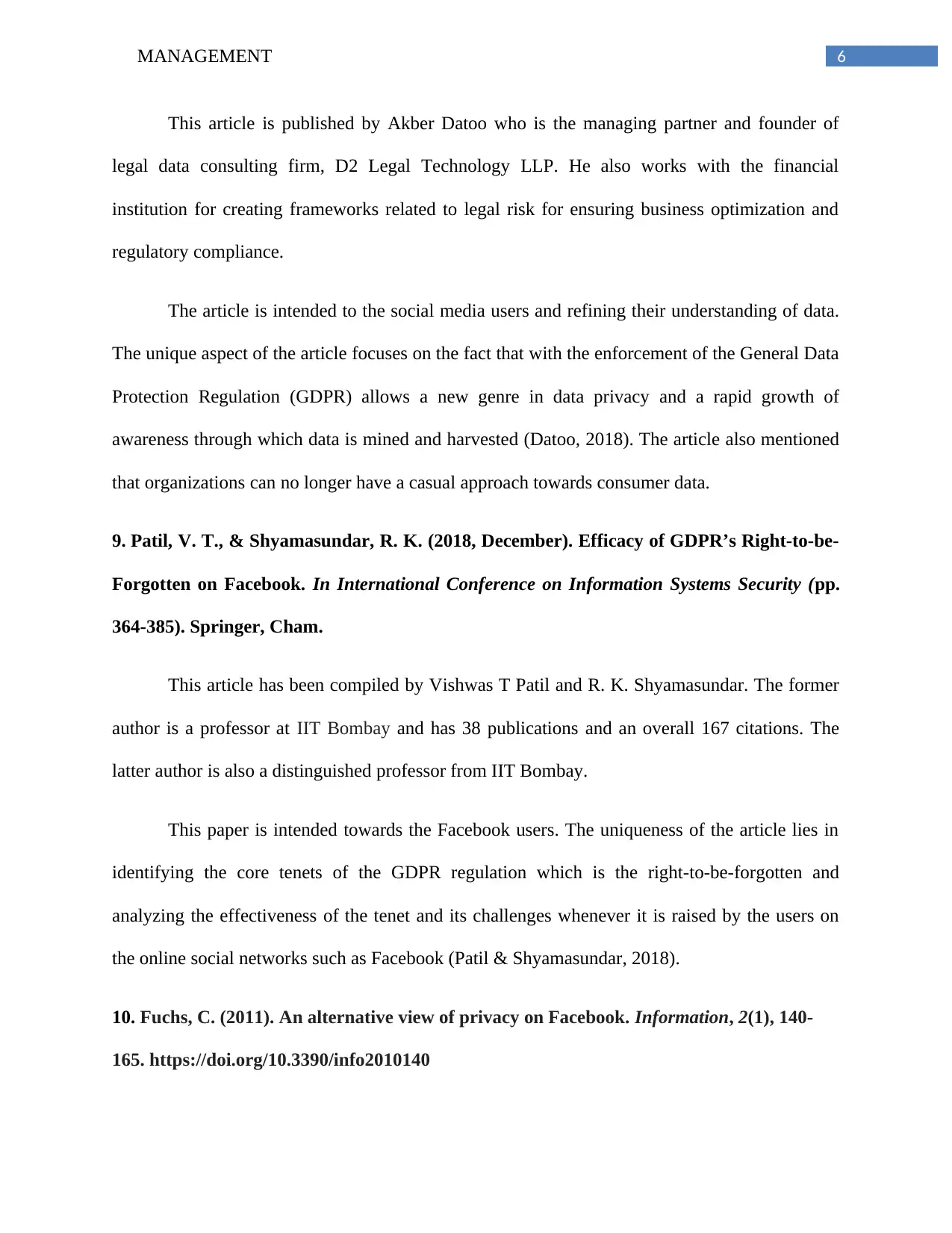
6MANAGEMENT
This article is published by Akber Datoo who is the managing partner and founder of
legal data consulting firm, D2 Legal Technology LLP. He also works with the financial
institution for creating frameworks related to legal risk for ensuring business optimization and
regulatory compliance.
The article is intended to the social media users and refining their understanding of data.
The unique aspect of the article focuses on the fact that with the enforcement of the General Data
Protection Regulation (GDPR) allows a new genre in data privacy and a rapid growth of
awareness through which data is mined and harvested (Datoo, 2018). The article also mentioned
that organizations can no longer have a casual approach towards consumer data.
9. Patil, V. T., & Shyamasundar, R. K. (2018, December). Efficacy of GDPR’s Right-to-be-
Forgotten on Facebook. In International Conference on Information Systems Security (pp.
364-385). Springer, Cham.
This article has been compiled by Vishwas T Patil and R. K. Shyamasundar. The former
author is a professor at IIT Bombay and has 38 publications and an overall 167 citations. The
latter author is also a distinguished professor from IIT Bombay.
This paper is intended towards the Facebook users. The uniqueness of the article lies in
identifying the core tenets of the GDPR regulation which is the right-to-be-forgotten and
analyzing the effectiveness of the tenet and its challenges whenever it is raised by the users on
the online social networks such as Facebook (Patil & Shyamasundar, 2018).
10. Fuchs, C. (2011). An alternative view of privacy on Facebook. Information, 2(1), 140-
165. https://doi.org/10.3390/info2010140
This article is published by Akber Datoo who is the managing partner and founder of
legal data consulting firm, D2 Legal Technology LLP. He also works with the financial
institution for creating frameworks related to legal risk for ensuring business optimization and
regulatory compliance.
The article is intended to the social media users and refining their understanding of data.
The unique aspect of the article focuses on the fact that with the enforcement of the General Data
Protection Regulation (GDPR) allows a new genre in data privacy and a rapid growth of
awareness through which data is mined and harvested (Datoo, 2018). The article also mentioned
that organizations can no longer have a casual approach towards consumer data.
9. Patil, V. T., & Shyamasundar, R. K. (2018, December). Efficacy of GDPR’s Right-to-be-
Forgotten on Facebook. In International Conference on Information Systems Security (pp.
364-385). Springer, Cham.
This article has been compiled by Vishwas T Patil and R. K. Shyamasundar. The former
author is a professor at IIT Bombay and has 38 publications and an overall 167 citations. The
latter author is also a distinguished professor from IIT Bombay.
This paper is intended towards the Facebook users. The uniqueness of the article lies in
identifying the core tenets of the GDPR regulation which is the right-to-be-forgotten and
analyzing the effectiveness of the tenet and its challenges whenever it is raised by the users on
the online social networks such as Facebook (Patil & Shyamasundar, 2018).
10. Fuchs, C. (2011). An alternative view of privacy on Facebook. Information, 2(1), 140-
165. https://doi.org/10.3390/info2010140
Paraphrase This Document
Need a fresh take? Get an instant paraphrase of this document with our AI Paraphraser
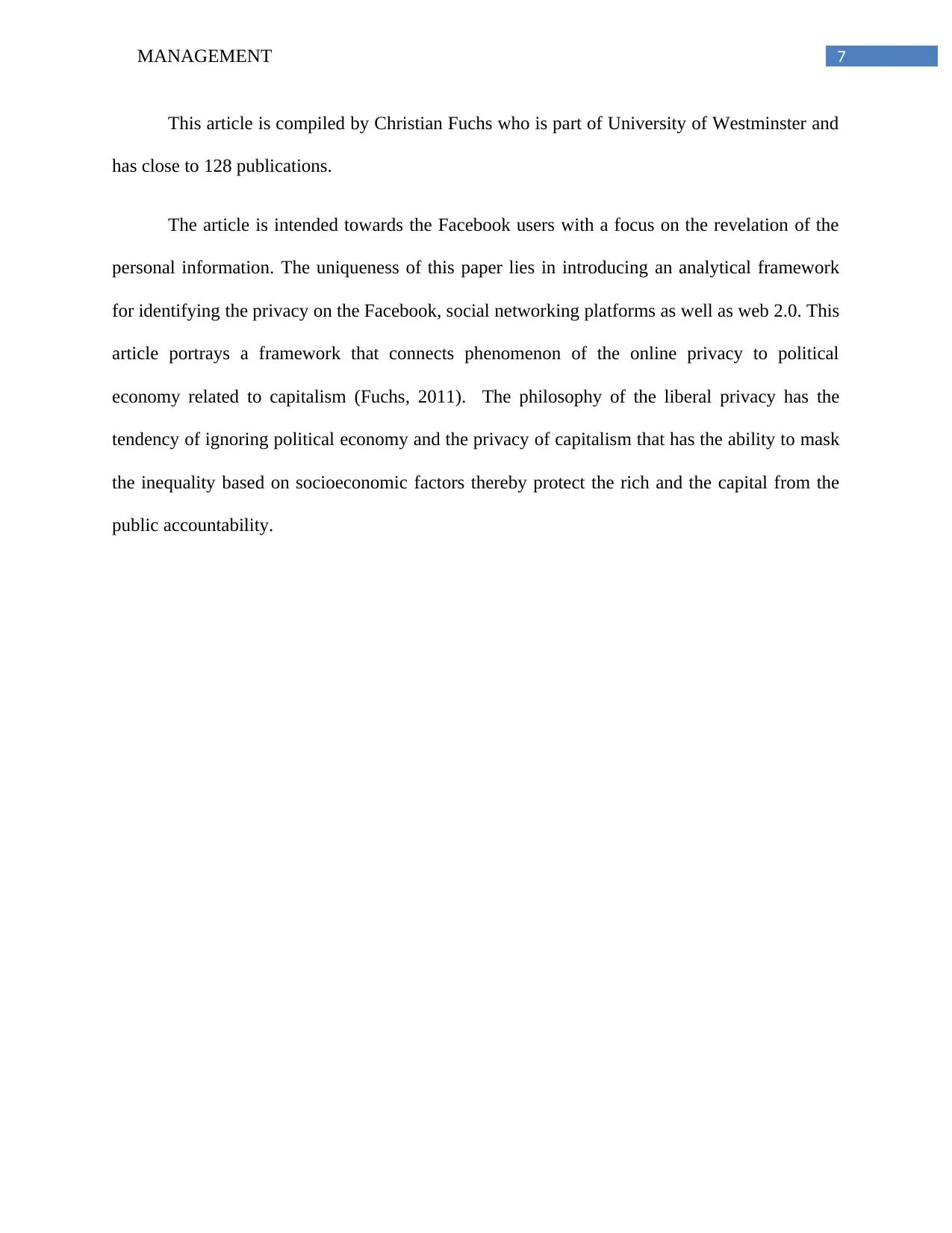
7MANAGEMENT
This article is compiled by Christian Fuchs who is part of University of Westminster and
has close to 128 publications.
The article is intended towards the Facebook users with a focus on the revelation of the
personal information. The uniqueness of this paper lies in introducing an analytical framework
for identifying the privacy on the Facebook, social networking platforms as well as web 2.0. This
article portrays a framework that connects phenomenon of the online privacy to political
economy related to capitalism (Fuchs, 2011). The philosophy of the liberal privacy has the
tendency of ignoring political economy and the privacy of capitalism that has the ability to mask
the inequality based on socioeconomic factors thereby protect the rich and the capital from the
public accountability.
This article is compiled by Christian Fuchs who is part of University of Westminster and
has close to 128 publications.
The article is intended towards the Facebook users with a focus on the revelation of the
personal information. The uniqueness of this paper lies in introducing an analytical framework
for identifying the privacy on the Facebook, social networking platforms as well as web 2.0. This
article portrays a framework that connects phenomenon of the online privacy to political
economy related to capitalism (Fuchs, 2011). The philosophy of the liberal privacy has the
tendency of ignoring political economy and the privacy of capitalism that has the ability to mask
the inequality based on socioeconomic factors thereby protect the rich and the capital from the
public accountability.
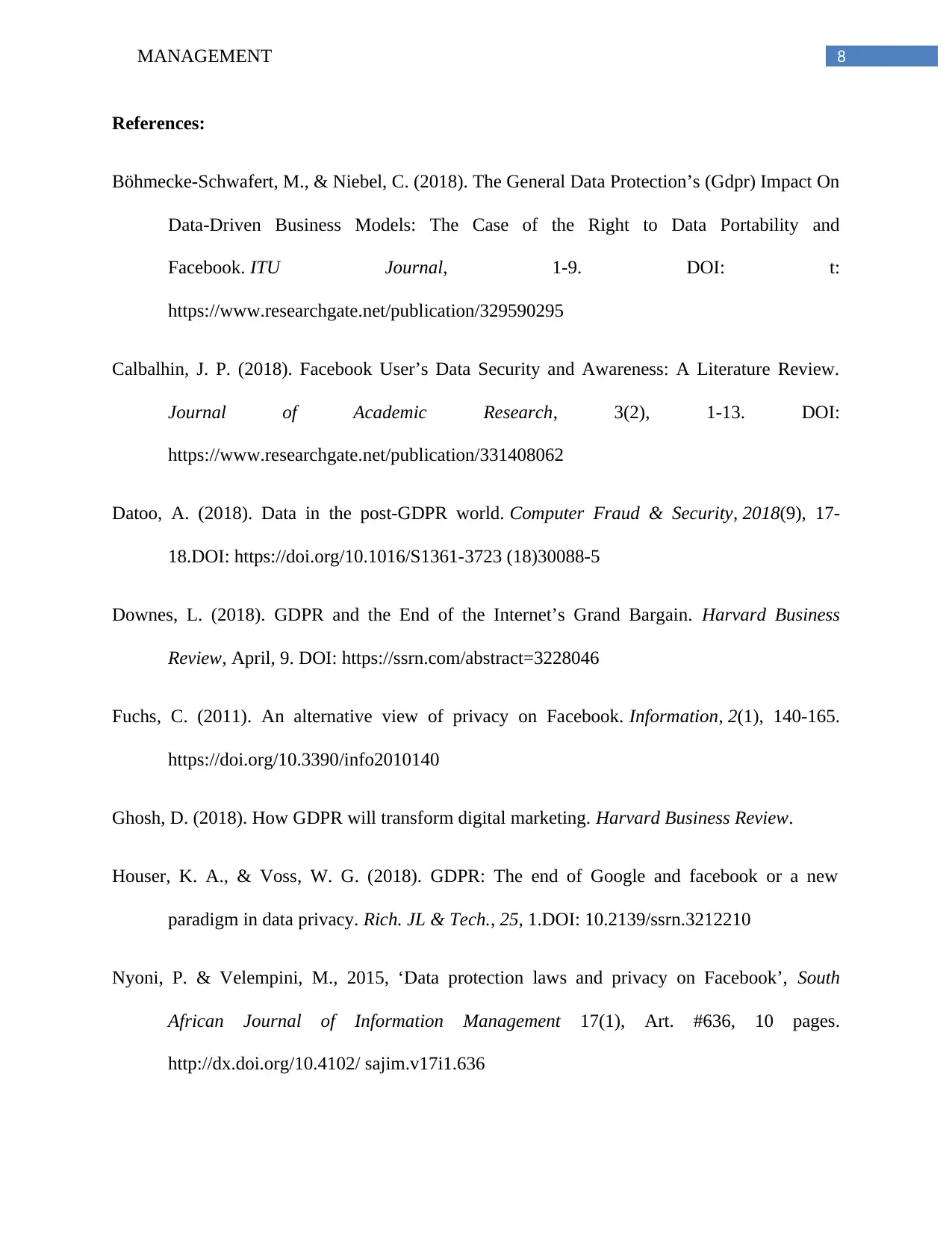
8MANAGEMENT
References:
Böhmecke-Schwafert, M., & Niebel, C. (2018). The General Data Protection’s (Gdpr) Impact On
Data-Driven Business Models: The Case of the Right to Data Portability and
Facebook. ITU Journal, 1-9. DOI: t:
https://www.researchgate.net/publication/329590295
Calbalhin, J. P. (2018). Facebook User’s Data Security and Awareness: A Literature Review.
Journal of Academic Research, 3(2), 1-13. DOI:
https://www.researchgate.net/publication/331408062
Datoo, A. (2018). Data in the post-GDPR world. Computer Fraud & Security, 2018(9), 17-
18.DOI: https://doi.org/10.1016/S1361-3723 (18)30088-5
Downes, L. (2018). GDPR and the End of the Internet’s Grand Bargain. Harvard Business
Review, April, 9. DOI: https://ssrn.com/abstract=3228046
Fuchs, C. (2011). An alternative view of privacy on Facebook. Information, 2(1), 140-165.
https://doi.org/10.3390/info2010140
Ghosh, D. (2018). How GDPR will transform digital marketing. Harvard Business Review.
Houser, K. A., & Voss, W. G. (2018). GDPR: The end of Google and facebook or a new
paradigm in data privacy. Rich. JL & Tech., 25, 1.DOI: 10.2139/ssrn.3212210
Nyoni, P. & Velempini, M., 2015, ‘Data protection laws and privacy on Facebook’, South
African Journal of Information Management 17(1), Art. #636, 10 pages.
http://dx.doi.org/10.4102/ sajim.v17i1.636
References:
Böhmecke-Schwafert, M., & Niebel, C. (2018). The General Data Protection’s (Gdpr) Impact On
Data-Driven Business Models: The Case of the Right to Data Portability and
Facebook. ITU Journal, 1-9. DOI: t:
https://www.researchgate.net/publication/329590295
Calbalhin, J. P. (2018). Facebook User’s Data Security and Awareness: A Literature Review.
Journal of Academic Research, 3(2), 1-13. DOI:
https://www.researchgate.net/publication/331408062
Datoo, A. (2018). Data in the post-GDPR world. Computer Fraud & Security, 2018(9), 17-
18.DOI: https://doi.org/10.1016/S1361-3723 (18)30088-5
Downes, L. (2018). GDPR and the End of the Internet’s Grand Bargain. Harvard Business
Review, April, 9. DOI: https://ssrn.com/abstract=3228046
Fuchs, C. (2011). An alternative view of privacy on Facebook. Information, 2(1), 140-165.
https://doi.org/10.3390/info2010140
Ghosh, D. (2018). How GDPR will transform digital marketing. Harvard Business Review.
Houser, K. A., & Voss, W. G. (2018). GDPR: The end of Google and facebook or a new
paradigm in data privacy. Rich. JL & Tech., 25, 1.DOI: 10.2139/ssrn.3212210
Nyoni, P. & Velempini, M., 2015, ‘Data protection laws and privacy on Facebook’, South
African Journal of Information Management 17(1), Art. #636, 10 pages.
http://dx.doi.org/10.4102/ sajim.v17i1.636
⊘ This is a preview!⊘
Do you want full access?
Subscribe today to unlock all pages.

Trusted by 1+ million students worldwide
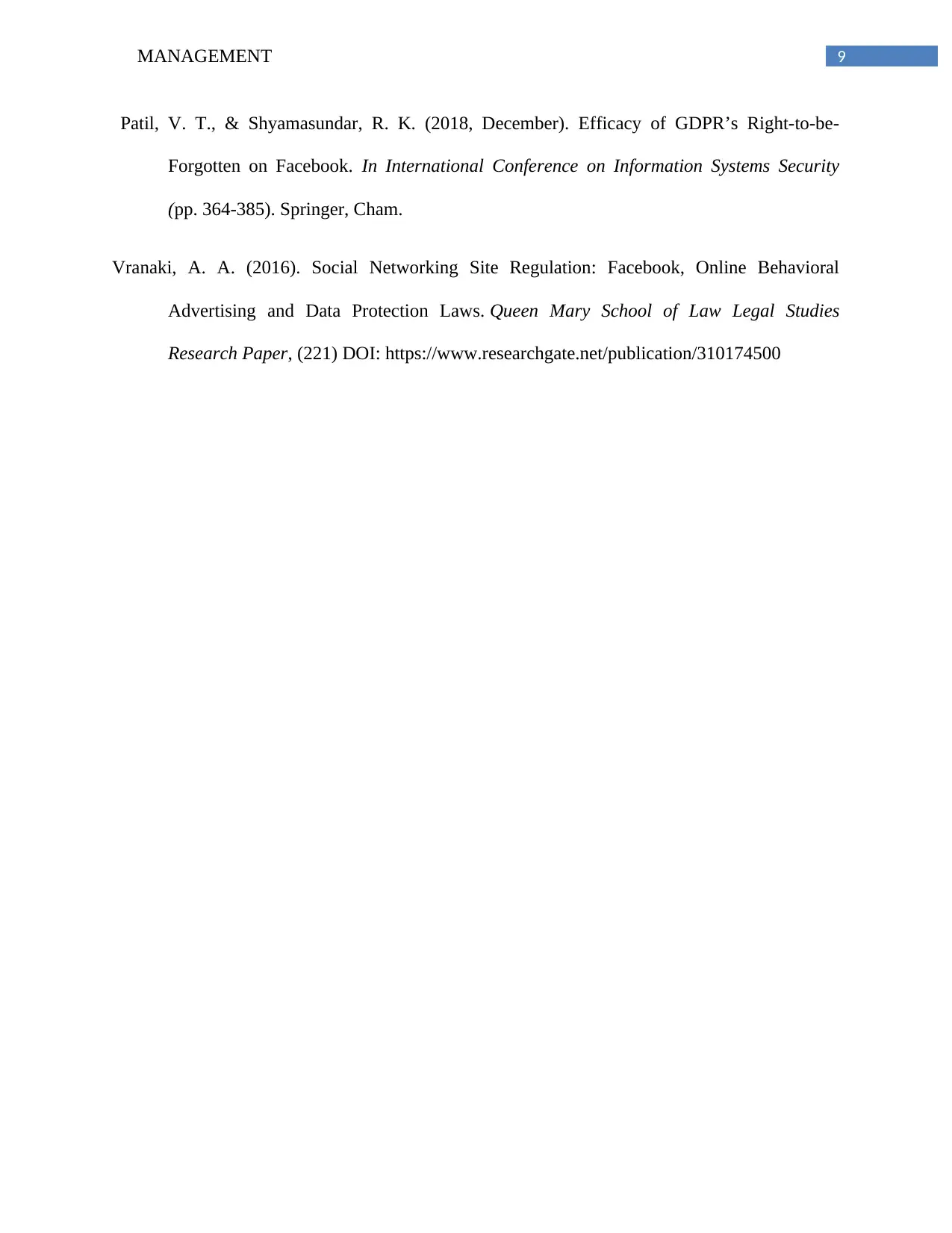
9MANAGEMENT
Patil, V. T., & Shyamasundar, R. K. (2018, December). Efficacy of GDPR’s Right-to-be-
Forgotten on Facebook. In International Conference on Information Systems Security
(pp. 364-385). Springer, Cham.
Vranaki, A. A. (2016). Social Networking Site Regulation: Facebook, Online Behavioral
Advertising and Data Protection Laws. Queen Mary School of Law Legal Studies
Research Paper, (221) DOI: https://www.researchgate.net/publication/310174500
Patil, V. T., & Shyamasundar, R. K. (2018, December). Efficacy of GDPR’s Right-to-be-
Forgotten on Facebook. In International Conference on Information Systems Security
(pp. 364-385). Springer, Cham.
Vranaki, A. A. (2016). Social Networking Site Regulation: Facebook, Online Behavioral
Advertising and Data Protection Laws. Queen Mary School of Law Legal Studies
Research Paper, (221) DOI: https://www.researchgate.net/publication/310174500
1 out of 10
Your All-in-One AI-Powered Toolkit for Academic Success.
+13062052269
info@desklib.com
Available 24*7 on WhatsApp / Email
![[object Object]](/_next/static/media/star-bottom.7253800d.svg)
Unlock your academic potential
Copyright © 2020–2026 A2Z Services. All Rights Reserved. Developed and managed by ZUCOL.